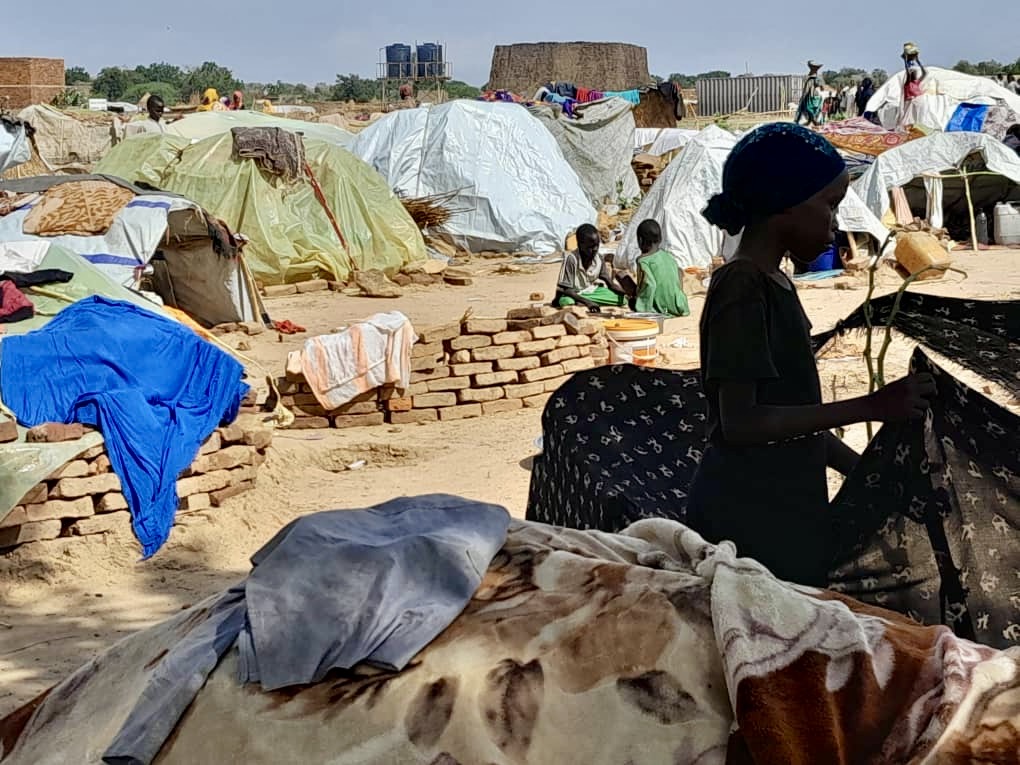The Sudan Conflict Monitor – 19 June update
The Sudan Conflict Monitor is a rapid response to the expanding war in Sudan written through a peace-building, human rights, and justice lens. Here we have tried to capture the five most important stories in Sudan. Please share it widely.
 Powered by Ayin Media, Human Rights Hub, and the Sudan Transparency and Policy Tracker
Powered by Ayin Media, Human Rights Hub, and the Sudan Transparency and Policy Tracker
- Military deadlock continues: Fighting focused on strategic sites. Both sides seem to still believe a military victory is possible as fighting concentrates on strategic sites
- Ethnic cleansing in Al Geneina. RSF is unleashing ethnically based violence in West Darfur
- RSF’s abuses, looting, and hostages. Evidence of RSF looting and detention of activists is growing
- Refugees restricted at the Egyptian border. Egypt is making it harder for Sudanese refugees to flee
- International responses: Efforts to move to an AU framework for negotiations falter, US sanctions.
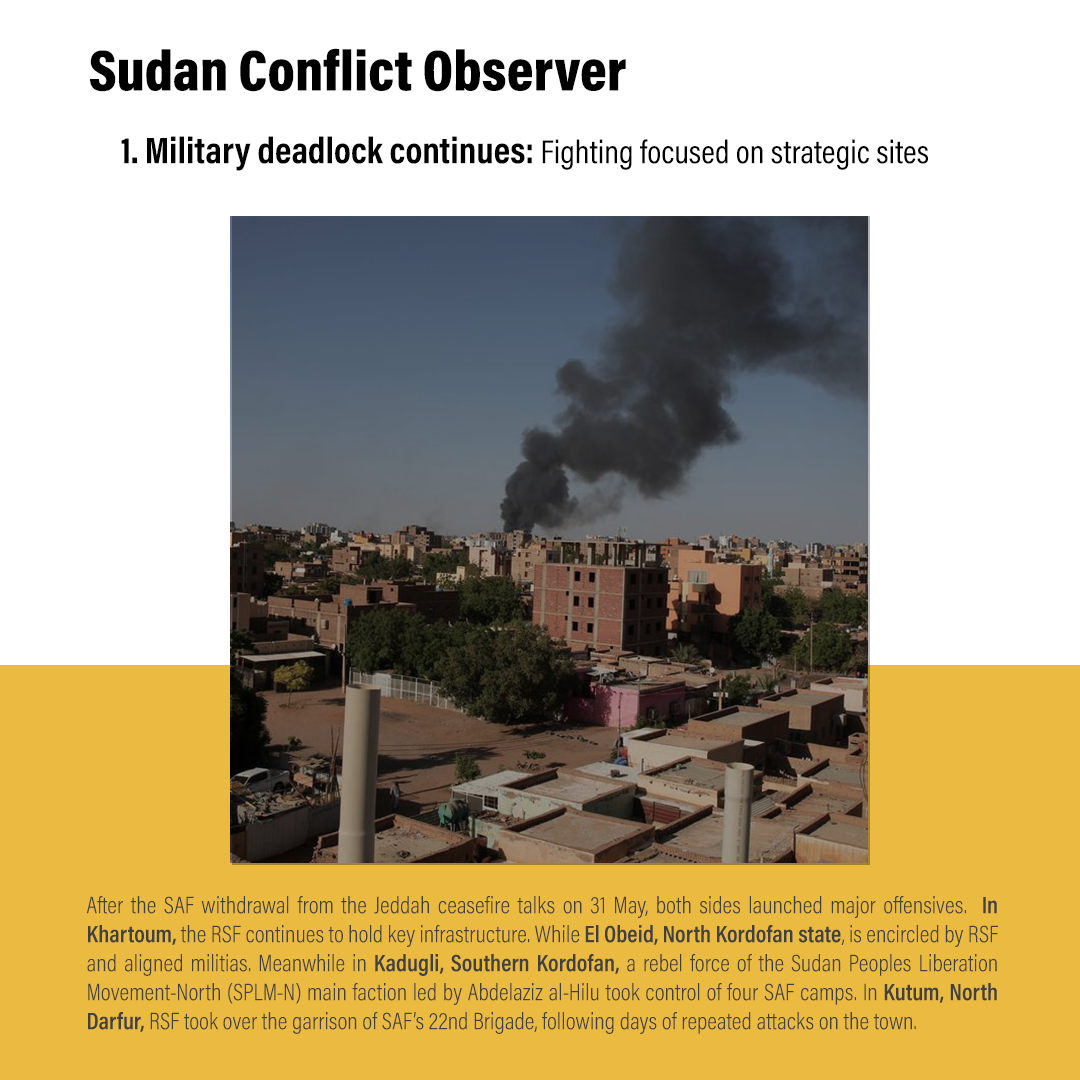 Both warring sides apparently believe they can attain a military advantage and will not support any substantive mediation. After the SAF withdrawal from the Jeddah ceasefire talks on 31 May, both sides launched major offensives. Recent developments in the war are described below:
Both warring sides apparently believe they can attain a military advantage and will not support any substantive mediation. After the SAF withdrawal from the Jeddah ceasefire talks on 31 May, both sides launched major offensives. Recent developments in the war are described below:
The capital
In the capital, RSF continues to hold key infrastructure including Khartoum Airport, the Presidential Palace, Al-Gaili Refinery, Goad industrial complex, Omdurman Radio and TV, and multiple bridges over the Nile. However, its supply lines remain tenuous from western Sudan’s border while the SAF has comparatively easier access to supplies through northern, southern, and eastern routes.
At the time of writing, the RSF had taken control of the Yarmouk Munitions Factory in south Khartoum, which restricted SAF’s access to fuel and ammunition within the city. Open-source images indicate considerable fire damage to the fuel storage areas in the complex. The factory was a lifeline for SAF’s Armored Corps Headquarters in Sharjah, roughly 3 kilometers north of Yarmouk.
The warring sides are now focused on control of four other key locations: the Wadi Saeedna Airfield situated north of the capital, the Mohandeseen Military Area in Omdurman, the al-Jabra area in southwest Khartoum, and the General Command Headquarters and surrounding Kober area in Bahri, Khartoum North. Wadi Saeedna is particularly important for the army since it is the sole SAF-controlled airfield in Khartoum and acts as a vital supply line. The Mohandiseen Military area is also a SAF stronghold that hosts the Engineering Corps, Alia Military Hospital, Nimeiri Military Academy, and the Omdurman Tank Division.
With RSF soldiers embedded within the capital area, often using civilian residences as their base, SAF are increasingly relying on indiscriminate bombing campaigns to dislodge the RSF forces –invariably targeting civilians in the process. On 18 June, a SAF airforce strike on the Mayo area of southern Khartoum killed 17 civilians, including five children, according to local sources.
El Obeid, North Kordofan
El Obeid, the capital of North Kordofan state, remains under an RSF siege. The national army has managed to maintain control of the town but is encircled by RSF and aligned militias, most of whom include Hawazma and Misseriya from South and West Kordofan. Sources on the ground believe a major offensive by the RSF is imminent. The SAF sent reinforcements from other garrisons in the area to defend the city.
The city is a militarily strategic location, sitting at the center of several roads connecting western and southern Sudan to Khartoum. Its commodity market is the largest trading center for Sudan’s agricultural exports, including gum arabic, sesame, ground nuts, sorghum, and millet. Its civilian airport also serves the military, a key reason why the RSF targeted it early in the conflict and destroyed three fighter jets on the ground and a jet fuel storage facility.
Kadugli, Southern Kordofan
On June 8, a rebel force of the Sudan Peoples Liberation Movement-North (SPLM-N) main faction led by Abdelaziz al-Hilu took control of four SAF camps around Kadugli, the capital of South Kordofan State. The incident raised concerns that the war was expanding to the Nuba Mountains. However, it is unlikely that the SPLM-N will venture beyond the camps and attempt to take over Kadugli, risking a full-fledged confrontation with the army.
Informed sources told us that the move occurred in reaction to incidents of robbery of people fleeing the war to SPLM-N-held territory. SPLM-N also has an interest in preventing RSF recruitment among local militias from the cattle herding Arab communities in the area, and in controlling access to its areas. The SPLM-N move also signals to mediators and Khartoum politicians that any political solutions for the current crisis would have to take into consideration the demands of the Nuba people.
Kutum, North Darfur
On June 4, RSF took over the garrison of SAF’s 22nd Brigade in Kutum, following days of repeated attacks on the town. A video posted on the RSF’s official Facebook page showed RSF soldiers showcasing vehicles and munitions they had taken from the Sudanese army. Media reported RSF and allied militias attacked Kassab displaced persons’ camp, killing at least forty civilians, injuring scores more, and forcibly re-displacing thousands. The gravity of this attack recalls those carried out by Janjaweed forces in 2003, 2004, and 2005 against the residents of Kutum and the surrounding area. Dozens of the injured were evacuated to El Fasher, the capital city of North Darfur State.
Kutum is an important strategic asset to the RSF for several reasons. First, control over the area allows the RSF to secure the route between Darfur and Khartoum as well as the supply route to the Chadian and Libyan borders. Second, they can disrupt communication between rebel groups and the Zaghawa people in the area. Third, they can prevent or disrupt SAF recruitment drives of the Mahameed Arabs who are largely opposed to the RSF.
Kutum could also serve as an advance defense post for the localities of Zurug and Jinaig which RSF leader Mohamed Hamdan Dagalo (“Hemedti”) designated as his social base where he intended to settle his community, consolidating political power in the region. Finally, RSF units in the Hashaba area have been involved in the illicit mining of gold through artisanal means. Thus, by controlling this area RSF can also secure gold mining operations in the area.
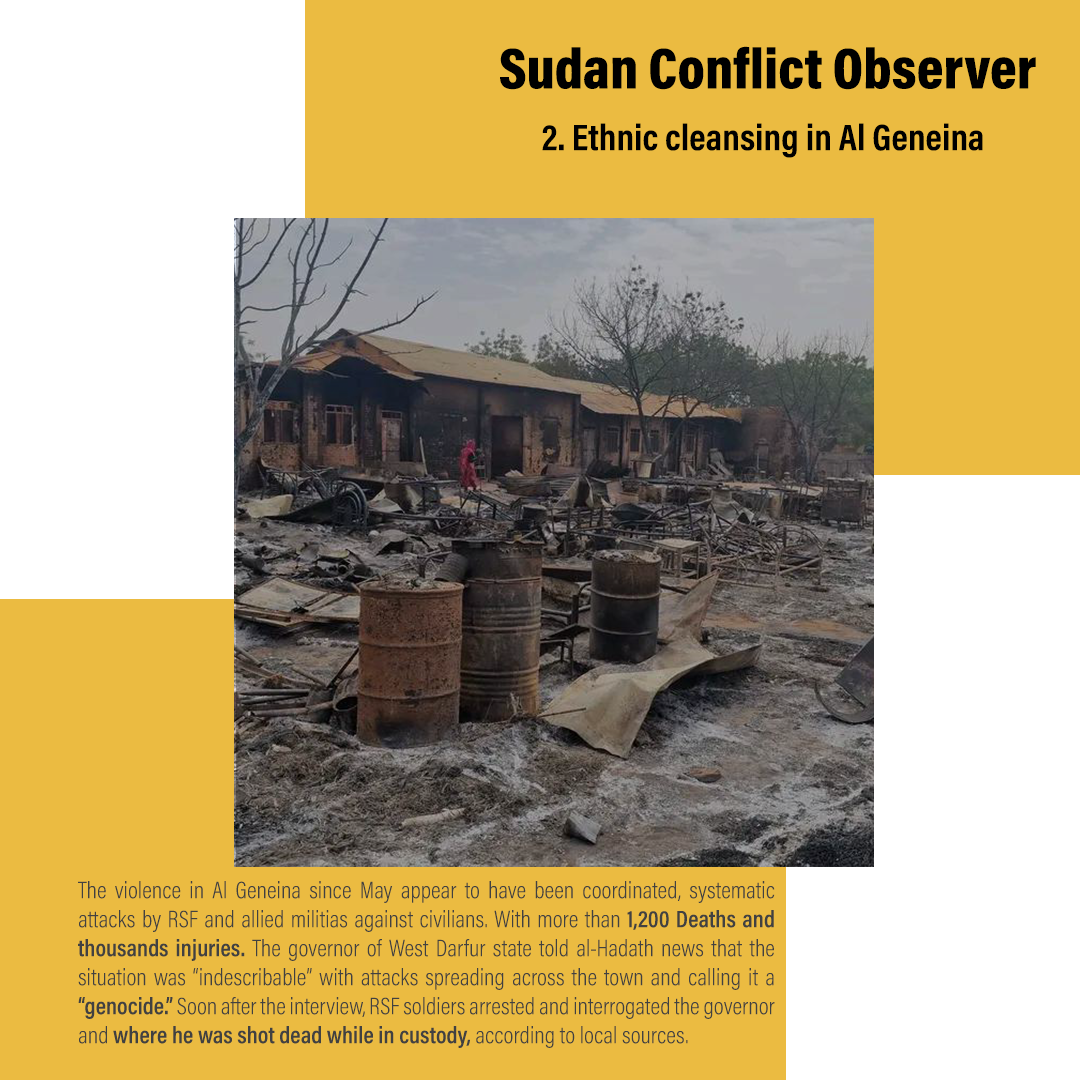 The capital of West Darfur has seen major violence since 2019 when the UN/AU peacekeeping mission withdrew under pressure from the government of Sudan. However, tensions escalated dramatically with the outbreak of war in Khartoum. Since late April 2023, the town has been mired in conflict between RSF and its allies as well as local communities who have taken up arms at various points.
The capital of West Darfur has seen major violence since 2019 when the UN/AU peacekeeping mission withdrew under pressure from the government of Sudan. However, tensions escalated dramatically with the outbreak of war in Khartoum. Since late April 2023, the town has been mired in conflict between RSF and its allies as well as local communities who have taken up arms at various points.
As the violence surged and lawlessness took hold, the RSF appears to have unleashed its soldiers to attack civilians based on ethnic identity. Violent episodes in May and the first half of June appear to have been coordinated, systematic attacks by RSF and allied militias against civilians, civilian objects, hospitals, homes, and food. Doctors reported the death toll has risen to over 1,200 and thousands have been injured. Local sources believe the numbers may rise considerably given the lack of functioning hospitals and other medical services. More than a hundred thousand people have now fled over the Chadian border, many have arrived with gunshot wounds and nothing but the clothes they were wearing.
Survivors who fled to Chad told journalists how the attackers systematically targeted non-Arab populations, especially the Massalit. Social media footage shows RSF soldiers using ethnic slurs and claiming to turn the area into an Arab one. The governor of West Darfur state told al-Hadath news that the situation was “indescribable” with attacks spreading across the town and calling it a “genocide.” Soon after the interview, RSF soldiers arrested the governor. After two hours of interrogation, local sources said, the governor was shot dead while in custody.
The head of UNITAMS and the UN’s Special Adviser on the Prevention of Genocide both condemned the violence but did not name perpetrators or acknowledge RSF’s role in these latest attacks. Under international law, commanders are liable for the crimes committed by the forces under their command. The RSF’s leaders have not commented on the situation or taken any action to prevent or punish the alleged serious crimes by their forces.
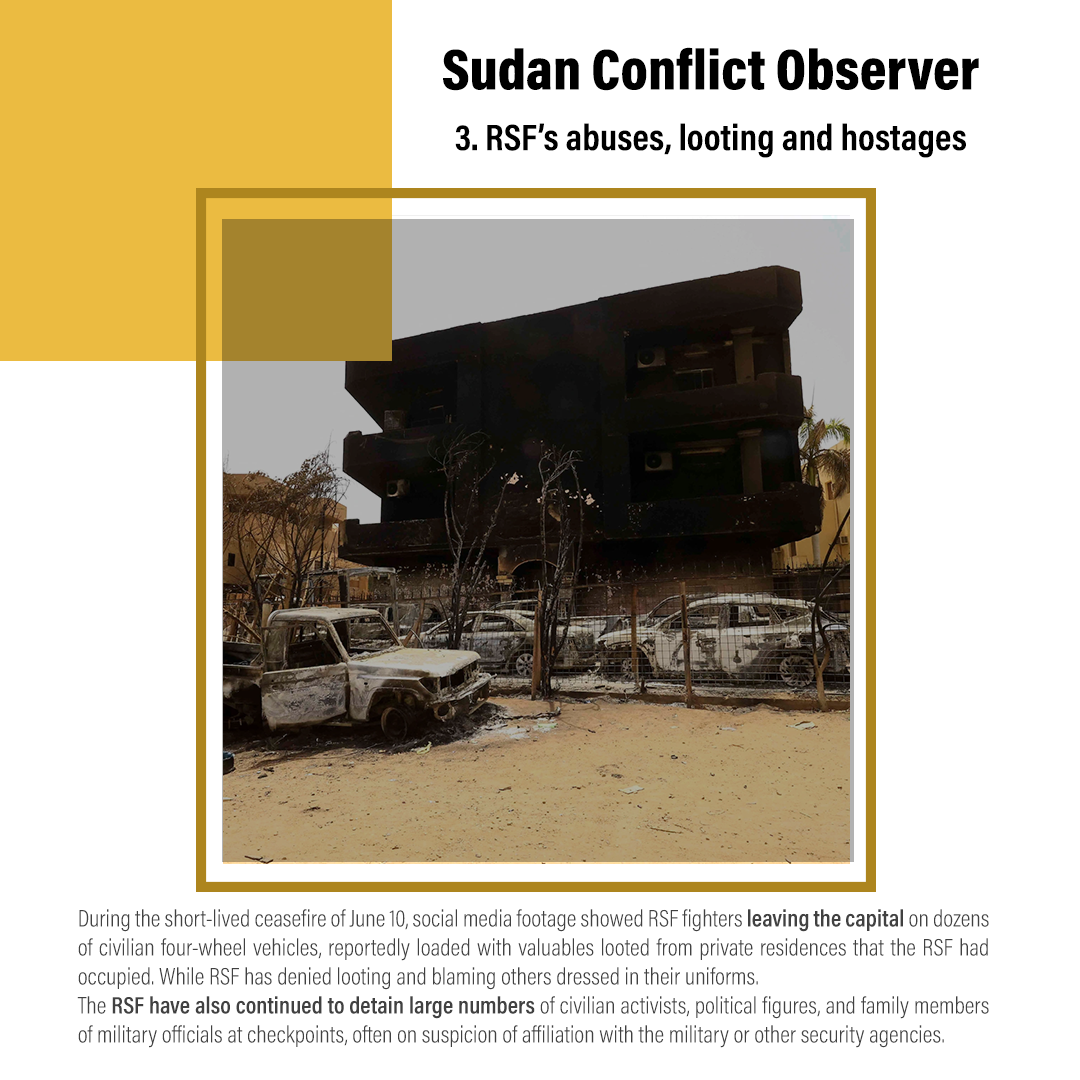 During the short-lived ceasefire of June 10, social media footage showed RSF fighters leaving the capital on dozens of civilian four-wheel vehicles, reportedly loaded with valuables looted from private residences that the RSF had occupied. Several humanitarian agencies have also reported the theft of their vehicles. On June 4, a local news site reported the arrival of hundreds of luxury vehicles to al-Daein and Nyala driven by RSF soldiers returning from Khartoum.
During the short-lived ceasefire of June 10, social media footage showed RSF fighters leaving the capital on dozens of civilian four-wheel vehicles, reportedly loaded with valuables looted from private residences that the RSF had occupied. Several humanitarian agencies have also reported the theft of their vehicles. On June 4, a local news site reported the arrival of hundreds of luxury vehicles to al-Daein and Nyala driven by RSF soldiers returning from Khartoum.
The looted vehicles and goods are a huge asset for the RSF, just as the looting spree in early 2013 by militias from South Darfur and Chad assisted the Seleka rebels’ rise to power in the Central African Republic. The International Crisis Group noted at the time: “Cars owned by NGOs, the UN, and private companies were stolen and sold in neighboring countries on such a scale that the Seleka coup seemed more like a car theft operation than the result of political struggle.”
RSF has denied looting, especially of important historical sites, blaming others dressed in RSF uniforms. But these claims have not been convincing. RSF has failed to control the widespread abuses against the civilian population by its soldiers. It is worth recalling that RSF’s chain of command was weakened when SAF ordered 68 officers seconded to the RSF to report back to their units. All but three complied, leaving many units without onsite commanders and supervisors.
The RSF have also continued to detain large numbers of civilian activists, political figures, and family members of military officials at checkpoints, often on suspicion of affiliation with the military or other security agencies. Appeals intensified on social media to release them. The RSF routinely posts news on its official media outlets of its capture of SAF soldiers during battles. The RSF released an eighty-year retired army doctor to the ICRC after released footage showed them ill-treating him. However, it has not publicized the whereabouts of senior army officers or members of their families, known to have been taken hostage in the early hours and days of the war.
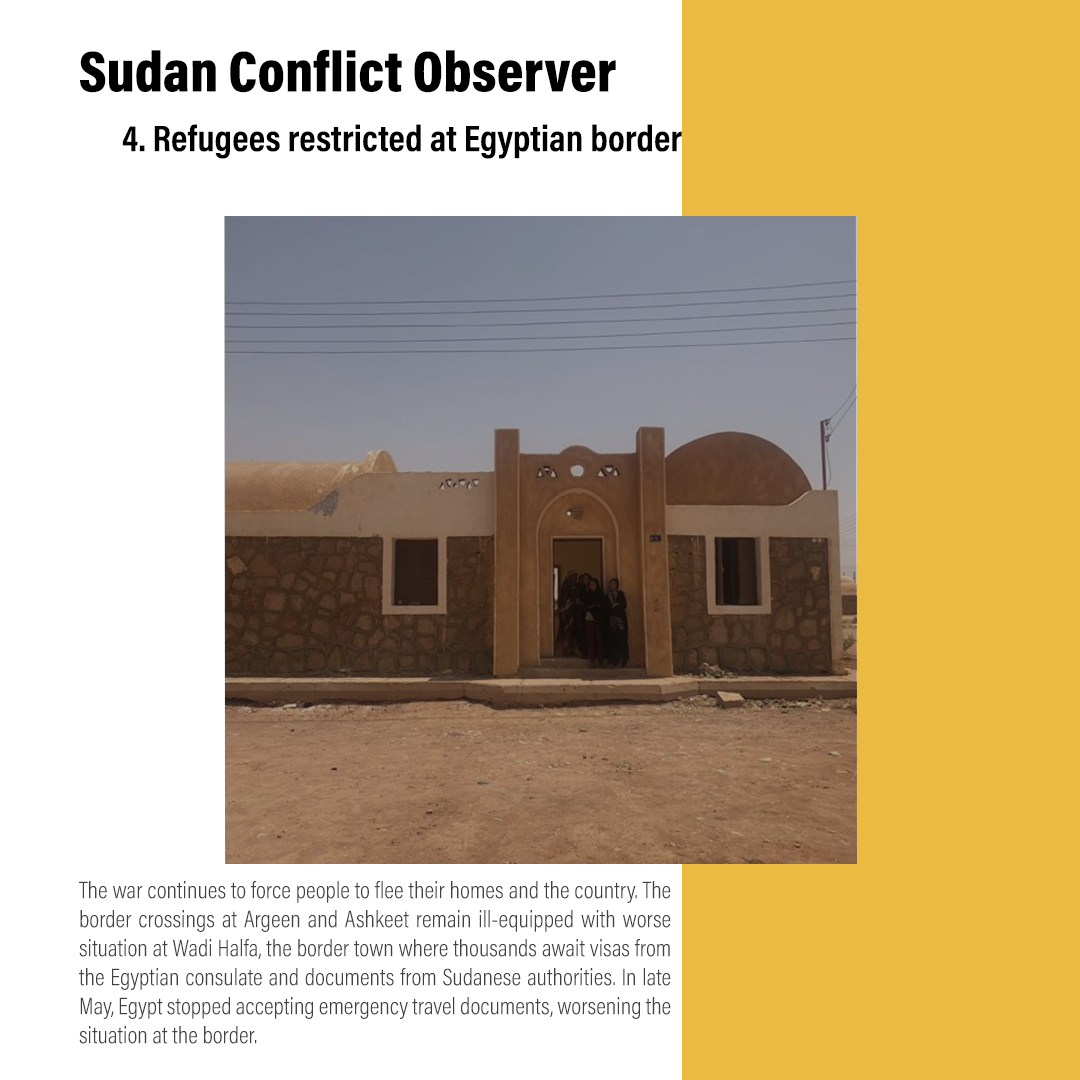 The war continues to force people to flee their homes and the country. As of June 6, over 1.9 million Sudanese were displaced from their homes, the vast majority from conflict zones in Khartoum and Darfur. The International Organization for Migration (IOM) reported that more than 470,000 had fled the country, with around 205,000 going to Egypt, roughly 125,000 to Chad, 90,000 to South Sudan, 40,000 to Ethiopia, 14,000 to Central African Republic, and around 1,500 to Libya.
The war continues to force people to flee their homes and the country. As of June 6, over 1.9 million Sudanese were displaced from their homes, the vast majority from conflict zones in Khartoum and Darfur. The International Organization for Migration (IOM) reported that more than 470,000 had fled the country, with around 205,000 going to Egypt, roughly 125,000 to Chad, 90,000 to South Sudan, 40,000 to Ethiopia, 14,000 to Central African Republic, and around 1,500 to Libya.
For people fleeing north to Egypt, the journey remains expensive and dangerous, with families having to pay exorbitant bus fares and navigate RSF and military checkpoints along the way. While many were able to leave within days or weeks after the outbreak of war, others remained despite the threat of attack by RSF looters or SAF bombs and a lack of basic supplies.
The border crossings at Argeen and Ashkeet – the only two overland crossing points available – remain ill-equipped lacking shaded areas, hygiene, and supplies for long queues. The situation is worse at Wadi Halfa, the border town where thousands await visas from the Egyptian consulate and documents from Sudanese authorities. Initially, Egypt required visas from males between 16 and 50, a glaring exception to the so-called Four Freedoms agreement between Egypt and Sudan. This requirement also contradicts Egypt’s obligations toward refugees under regional and international law.
In late May, Egypt stopped accepting emergency travel documents, worsening the situation at the border. In early June, Egypt further tightened restrictions requiring visas for everyone and increasing the backlog and waiting times. Authorities cited “unlawful activities” such as fraud on the Sudanese side.
Those who do manage to cross the border, often with few belongings and little or no cash on hand, either settle in Aswan and surrounding villages or travel by bus, train or air to Cairo, Alexandria, or other locations. For those without family ties or property in Egypt and limited resources, their only option is often to rely on community service organizations and volunteer groups who help find temporary housing and cash for newcomers. International organizations have been slow to fund these local efforts, which may not be formally registered or have sufficient capacity to scale up to meet the increasing needs.
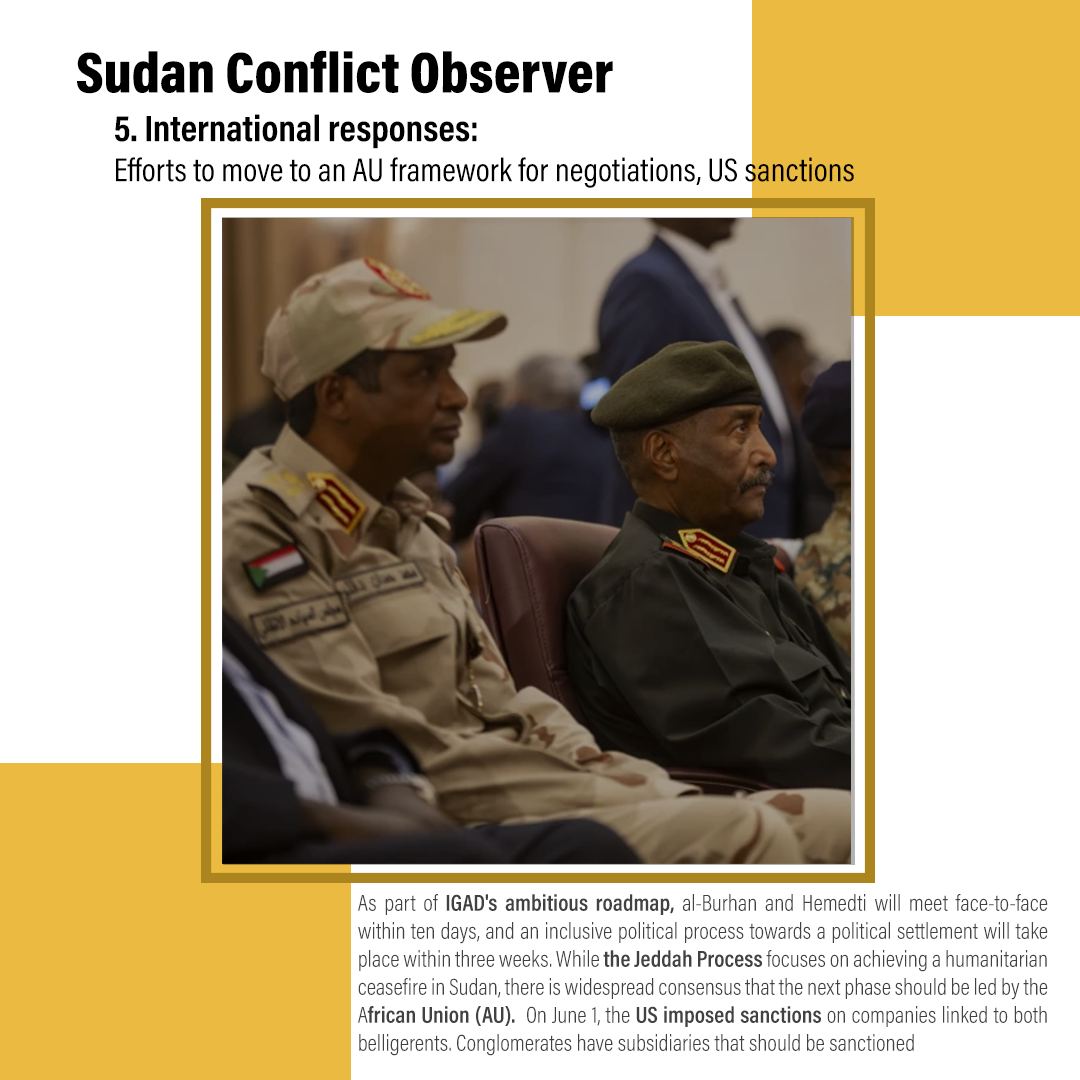 Regional
Regional
IGAD’s ambitious roadmap for resolving the crisis calls for a face-to-face meeting between al-Burhan and Hemedti within ten days, the opening of humanitarian corridors within two weeks, and the convening of an inclusive political process toward a political settlement within three weeks. However, none of this is likely to happen any time soon as on June 14 Sudan objected to IGAD’s appointment of Kenyan President William Ruto as chair of the “Quartet” of the Ethiopian, Djiboutian, and South Sudanese heads of state tasked with mediating for an end to the crisis in Sudan. Khartoum unconvincingly claimed that Kenya was harboring RSF leaders and insisted that the panel continue to be chaired by incumbent South Sudan, which has been more responsive to Sudanese military leaders’ pressures and incentives. A week earlier, Sudan’s military leaders declared the UN envoy Volker Perthes persona non-grata.
While the Jeddah Process continues to press the belligerents to agree on and strictly observe a humanitarian ceasefire, there is broad consensus that the next phase of the peace process in Sudan should be African Union (AU) – centered. The six-point “AU Roadmap for Resolving the Conflict in Sudan,” established a mechanism to harmonize all mediation efforts by regional and international actors, chaired by the AU Chairperson Musa Faki, assisted by Professor Mohamed El-Hacen Lebatt, Spokesperson for the AU Process for Sudan. Lebatt represented the AU in the mediation that led to the 2019 Constitutional Document and the December 2022 Political Framework Agreement. The AU Spokesperson has, however, faced past criticism by civil actors, allegedly for siding with the military and opposing the pro-democracy movement.
This arrangement raises serious concerns that the AU will again serve to legitimize the two generals who unleashed destruction and death on their country and people by giving them a role in the post-war political dispensation.
US
Despite their palpable frustration at the resumption of intense fighting on June 11 following a short-lived ceasefire, the Joint Facilitators (US and Saudi Arabia) of the Jeddah Process continued to engage with the warring sides pressing for renewed ceasefires.
On June 1 the US imposed sanctions on companies linked with the two belligerents, namely Al-Junaid Multi Activities Co Ltd, and Tradive General Trading L.L.C. owned by Hemedti and his brother, and the Defence Industries Systems (DIS) and Sudan Master Technology which are state-owned corporations controlled and operated by the army. The US Treasury also sanctioned several unnamed individuals, including leaders of the deposed Bashir government who are believed to be influencing the decisions of the senior command of the SAF.
The sanctioned companies are conglomerates, meaning the sanctions should extend to subsidiaries. Al-Junaid manages half a dozen subsidiaries operating in the gold processing and trade sector and in contracting and construction, transportation, road building, and general trading. The SAF’s DIS also oversees dozens of holding companies, several of which have more than a dozen subsidiaries that dominate the vital sectors of the economy.
The impact of these targeted sanctions remains unclear.
More from our partner organizations:
SUDAN TRANSPARENCY AND POLICY TRACKER
Sign up for the Sudan Transparency and Policy Tracker newsletter here
- Sudan Conflict Monitor, Issue #3 May 2023
AYIN NETWORK 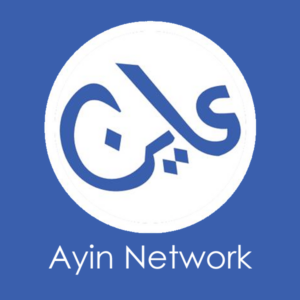
Follow Ayin: Youtube Facebook Twitter
- Widespread international and local condemnation of RSF attack on West Darfur State, governor’s death 16 June 2023
- The attack on Sudan’s heritage, the destruction of an invaluable library 12 June 2023
- Restarting a health centre in a war zone, Omdurman 7 June 2023
- The mass looting of Khartoum’s shops and markets 28 May 2023


